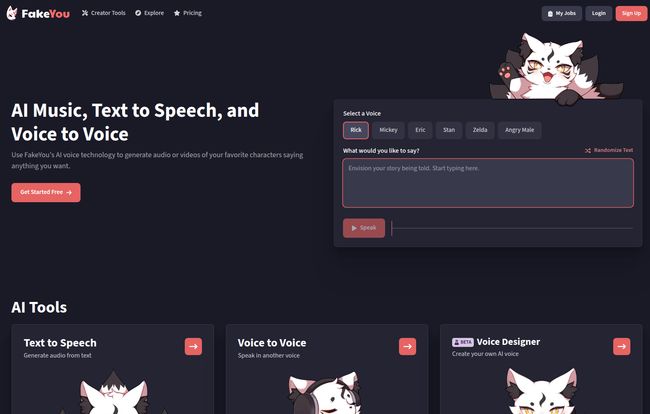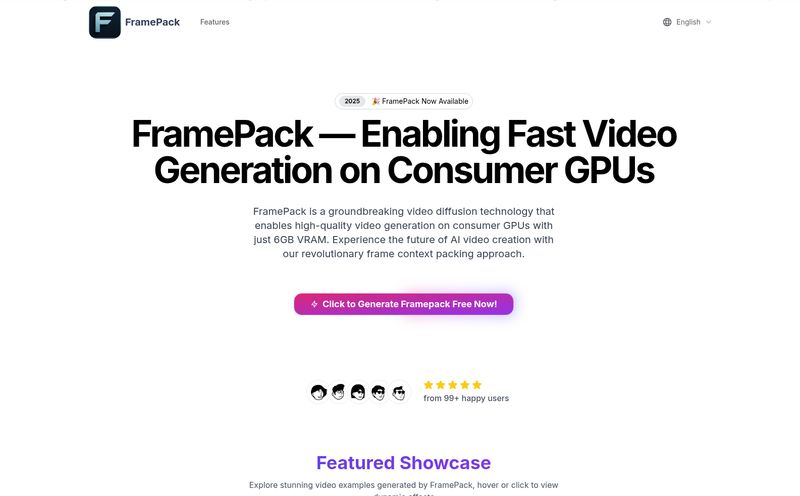In the world of SEO and content creation, we're constantly bombarded with the 'next big thing.' Another AI writer, another analytics platform, another tool that promises to 10x our workflow. Most of them are... fine. They do a job. But very few of them make me genuinely laugh out loud within five minutes of using them.
Then I stumbled back into FakeYou. It’s been on my radar for a while, mostly as a meme-generator, but I decided to give it a proper look from a professional standpoint. And what I found was this weird, wonderful, and slightly unhinged playground of AI voice technology. It's a tool that sits at the bizarre intersection of high-tech potential and pure internet nonsense. And honestly? It's a breath of fresh air.
So, is it just for making SpongeBob sing System of a Down, or is there a real, valuable tool for creators and marketers here? Let’s get into it.
So, What is FakeYou, Exactly?
At its core, FakeYou is an AI platform that lets you generate audio (and even video) using a massive library of voices. We're talking everything from beloved cartoon characters and movie stars to presidents and obscure video game personalities. The homepage itself, with its anime-style cat mascot, tells you this isn't your typical stuffy corporate software. It’s a bit quirky. It’s built for the internet culture of today.

Visit FakeYou
The platform boasts over 10 million users, which tells me I'm not the only one intrigued by this. It’s not some fly-by-night operation; there's a serious community and some impressive tech powering this thing. You basically type what you want to say, pick a voice, and the AI does the rest. But it goes a little deeper than that.
The FakeYou AI Toolkit Explored
FakeYou isn't just a one-trick pony. It offers a few different tools that cater to different needs, from quick audio clips to more advanced voice manipulation.
Text to Speech: The Bread and Butter
This is the feature most people will start with. It's exactly what it sounds like. You write some text, you browse the frankly staggering list of voices, and you hit 'Speak'. The first thing I did was make a certain cynical, portal-gun-wielding scientist order a pizza with extra anchovies. The result was surprisingly good. Not perfect, but definitely recognizable and hilarious. Some of the user-created voice models are better than others, so there's a bit of trial and error involved. It's less a precision instrument and more a box of chocolates—you never know what you're gonna get.
Voice to Voice: Putting Your Spin on Things
This is where things get more interesting for serious content creators. Instead of just typing text, you record your own audio. The AI then takes your pacing, your intonation, your emotion, and maps it onto the character voice you’ve selected. Imagine creating a tutorial video, but having it narrated by a famous movie villain. The potential for creating unique, engaging content here is huge. It moves beyond simple text-to-speech and into actual performance.
Voice Designer and Voice Cloning: Become the AI
For those who want to get really custom, there are the voice cloning and designer tools (like FS-TTS and Seed-VC you see on their site). This allows you to create your own AI voice model. You can either craft a new synthetic voice from scratch or, and this is the big one, clone your own voice. Why? Well, imagine you're a podcaster and you get sick. You could theoretically have your AI voice-clone read the ad-spots. Or you could create a consistent voice for your brand's video content without having to hire a voice actor for every single project. It’s powerful stuff.
The Good, The Bad, and The AI Voice
No tool is perfect, right? After playing around for a good few hours, here’s my honest breakdown.
What I really like is the sheer creative freedom. The voice library is a goldmine for anyone with a sense of humor. For social media managers or YouTubers trying to create viral clips, it's an absolute content machine. The more advanced voice-to-voice and cloning features also show a serious commitment to being more than just a toy. The community seems active, constantly adding new voices, which keeps the platform fresh.
On the flip side, the quality can be a bit of a mixed bag. Some voices are incredible, almost indistinguishable from the real thing. Others... sound like a robot doing a bad impression at a party. You have to experiment. Also, while there's a free tier, the best features—like faster processing, longer audio clips and private models—are locked behind a paywall. That's fair, servers cost money, but its something to be aware of. It also needs JavaScript to run, which is a non-issue for 99% of people but a point worth noting.
Let's Talk Money: FakeYou Pricing
Okay, the million-dollar question (or, in this case, the $12 question). How much does this cost? FakeYou runs on a freemium model. You can do a lot for free, but if you're going to use it regularly, you'll probably want to subscribe. The site has a few quotes from places like Techstars and La República, which adds a layer of credibility. Here's a quick rundown of their plans:
| Plan | Price | Key Features |
|---|---|---|
| Plus | $12 /month | Normal processing, unlimited TTS (up to 30s clips), up to 4 mins of Voice to Voice. Good for hobbyists. |
| Pro | $25 /month | Recommended. Faster processing, longer TTS clips (1 min), can upload private models, up to 5 mins of Voice to Voice. This feels like the sweet spot for content creators. |
| Elite | $40 /month | Fastest priority, even longer TTS clips (2 mins), can share private models, and unlimited Voice to Voice. For the power users and agencies. |
My take? If you're just having fun, stick with the free version. If you're a YouTuber, podcaster, or marketer who sees a real application for this, the Pro plan at $25 a month seems like the best value proposition. The faster processing and longer clip limits are pretty much essential for any serious work.
Who Is This Really For, Though?
So who should be signing up for FakeYou? I see a few key groups.
- Content Creators and YouTubers: This is a no-brainer. Creating skits, funny voiceovers, or unique narrations has never been easier.
- Social Media Managers: Want to make a meme that gets shared? Have a famous historical figure announce your brand's latest sale. It's instant, scroll-stopping content.
- Developers and Hobbyists: People looking to integrate fun, dynamic voices into their apps, games, or other projects will find a massive library to play with.
A quick word on ethics, because we have to. This is powerful tech. Use it for parody, for creative projects, for fun. Don't use it to create malicious deepfakes or spread misinformation. With great power comes great responsibility, and all that. Be cool.
Frequently Asked Questions
Is FakeYou legal to use?
For creative and parody purposes, absolutely. It falls under fair use in most cases. However, using it to defame someone or for fraudulent purposes is a big no-no and could get you in serious trouble.
Can I really clone my own voice with FakeYou?
Yes! The voice cloning tools are designed for this. It requires you to upload samples of your voice, and it's one of the premium features, but it's entirely possible to create your own personal AI voice.
How good is the audio quality, really?
It varies wildly. Think of it like a community-driven library. Some user-created voice models are fantastic, and some are just for laughs. Part of the fun is searching and finding the perfect—or imperfect—voice for your project. Generally, the more popular a character, the better the model tends to be.
Is there a completely free version of FakeYou?
Yep. You can use the basic text-to-speech features for free, but you'll have to wait in a queue for your audio to process, and you'll have limits on length. It's perfect for trying the platform out before committing to a paid plan.
Whats the difference between Text-to-Speech and Voice-to-Voice?
Simple: Text-to-Speech (TTS) creates audio from written text, often with a neutral, standard delivery. Voice-to-Voice (V2V) takes a recording of your own voice and applies your specific cadence, speed, and emotion to the AI voice you've chosen. It's much more expressive.
My Final Verdict
FakeYou is a fascinating tool. It's not the most polished, enterprise-ready AI platform on the market, and it doesn't try to be. Instead, it leans into the chaos of internet culture and provides a set of incredibly powerful tools in a fun, accessible package. For a content creator looking to inject some personality and humor into their work, or even a marketer looking for that next viral hit, it's an invaluable resource.
It's one of the few tools I'd recommend just for the fun of it. Go try it. The worst that can happen is you lose an hour of your day making a cartoon mouse recite classic poetry. And I'd argue that's an hour well spent.



